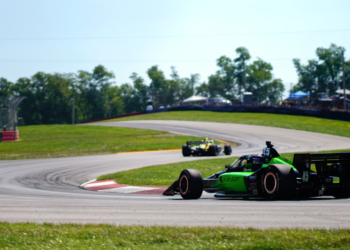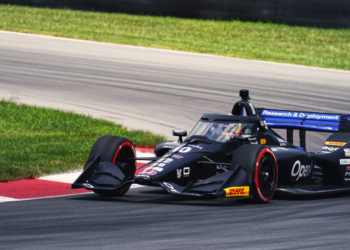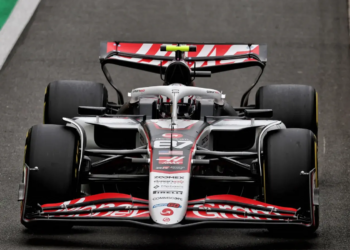Romain Grosjean’s race ban has created a lot of debate amongst F1 fans, but there is no doubt that it was a good decision by the race stewards. The stewards have to hand out more punishments which will act as a deterrent and teach drivers a lesson.
On the run down to turn one the young Frenchman made a very quick change of direction to his right, and squeezed Lewis Hamilton making contact inevitable.
When you re-watch the start Romain had plenty of space around him in the middle of the track, making the incident completely avoidable.
It was a very poorly judged piece of driving, which put drivers in danger and destroyed their races. The drivers involved were all very lucky to walk away unharmed.
This is now seven first lap incidents that Grosjean has got himself involved in. When you look at some of the other incidents one by one you could argue that he has suffered bad luck.
However when it occurs so many times you have to question whether it is just bad luck. On the other hand team mate Kimi Raikkonen hasn’t had a single first lap incident all year long.
I think there is definitely an art in surviving the first lap in terms of how/where you place your car, and getting the balance right between risk and reward. Experience is obviously a big factor too.
In my opinion a race ban will really make Grosjean think about his actions, and force him to be more careful next time he takes to the grid. Of course with one race ban the consequences of another serious offence could be even worse. That thought will play on his mind too.
I am sure having to sit out Monza (a circuit drivers love) and watch somebody else drive his car will really hurt him. A race ban is not a very nice black mark to have on your CV.
Furthermore with Lotus having such a strong car at the moment, Romain misses out on the chance to score a really strong result. If he had been in title contention it would be even more costly.
A race ban punishes a driver in a way a fine or a drive-through/grid penalty simply cannot match.
For most F1 drivers a fine is simply loose change. In some cases their teams might even pay the fine for them.
A driver can still recover and get a good result even with a drive-through or grid penalty. Michael Schumacher won the 2002 French GP, despite receiving a drive through penalty for crossing the white line on the exit of the pit lane.
Raikkonen won the 2005 Japanese GP despite having a ten place grid penalty. In that case it was an engine change rather than an offence on his part that got him the penalty. However it still shows how drivers can recover from these penalties and still get good results.
Therefore effectively there has been no punishment.
The FIA now need to make sure that more race bans are given to serious offences in the future, because they will act as a good deterrent.
Bans should be given to serious offences like we saw at the weekend, but also for a driver who has repeatedly been involved in/or caused incidents.
Clearly Pastor Maldonado is lucky he hasn’t been given a race ban yet. Grid penalties clearly haven’t been enough to get him to learn from his mistakes. I am sure he will face a race ban next time he commits an offence.
It’s amazing that no driver has been banned from a race since 1994 (although Yuji Ide did lose his super license back in 2006).
When you look back at the last 18 years you wonder whether we should have seen more race bans. I think the answer is definitely yes. It’s been far too under-utilised as a punishment.
For instance should Michael Schumacher have received a race ban for Rascasse-gate in 2006 or for nearly putting Rubens Barrichello in the wall in the 2010 Hungarian GP? Should Hamilton have received a race ban last year for the numerous incidents he was involved in? Takuma Sato caused a string of incidents during 2005.
In conclusion Grosjean’s punishment was quite brutal but if it makes him more careful, and makes him think about his actions then it could do him the world of good.
Afterall the last two recipients of a race ban (Schumacher and Mika Hakkinen) went on to become multiple world champions.
Similar punishments could also do the world of good to drivers in junior formulas. They need to learn their lesson early on in their careers.
Maybe some sort of yellow/red card system or license points could go a step furthur in acting as a deterrent, and improving driving standards.






